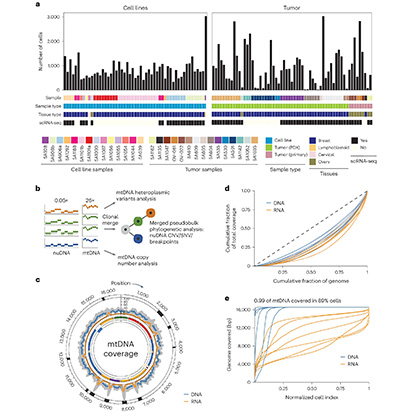Abstract
The extent of cell-to-cell variation in tumor mitochondrial DNA (mtDNA) copy number and genotype, and the phenotypic and evolutionary consequences of such variation, are poorly characterized. Here we use amplification-free single-cell whole-genome sequencing (Direct Library Prep (DLP+)) to simultaneously assay mtDNA copy number and nuclear DNA (nuDNA) in 72,275 single cells derived from immortalized cell lines, patient-derived xenografts and primary human tumors. Cells typically contained thousands of mtDNA copies, but variation in mtDNA copy number was extensive and strongly associated with cell size. Pervasive whole-genome doubling events in nuDNA associated with stoichiometrically balanced adaptations in mtDNA copy number, implying that mtDNA-to-nuDNA ratio, rather than mtDNA copy number itself, mediated downstream phenotypes. Finally, multimodal analysis of DLP+ and single-cell RNA sequencing identified both somatic loss-of-function and germline noncoding variants in mtDNA linked to heteroplasmy-dependent changes in mtDNA copy number and mitochondrial transcription, revealing phenotypic adaptations to disrupted nuclear/mitochondrial balance.
